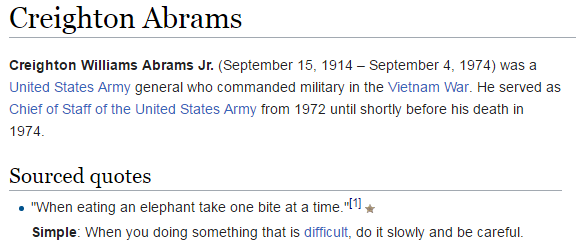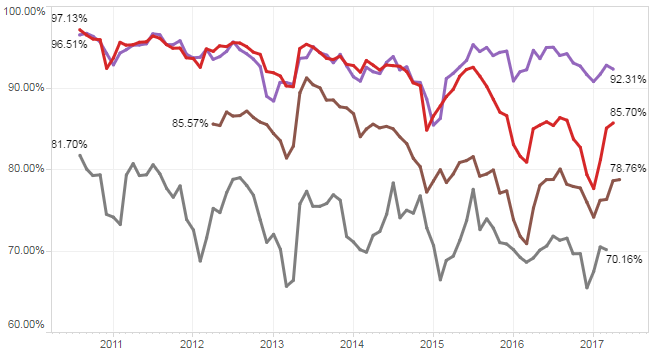The Elephant in the Room is an English-language metaphorical idiom for an obvious problem or risk no one wants to discuss.
And the undiscussability is also undiscussable.
So the problem or risk persists.
And people come to harm as a result.
Which is not the intended outcome.
So why do we behave this way?
Perhaps it is because the problem looks too big and too complicated to solve in one intuitive leap, and we give up and label it a “wicked problem”.
The well known quote “When eating an elephant take one bite at a time” is attributed to Creighton Abrams, a US Chief of Staff.
It says that even seemingly “impossible” problems can be solved so long as we proceed slowly and carefully, in small steps, learning as we go.
And the continued decline of the NHS UK Unscheduled Care performance seems to be an Elephant-in-the-Room problem, as shown by the monthly A&E 4-hour performance over the last 10 years and the fact that this chart is not published by the NHS.
Red = England, Brown=Wales, Grey=N.Ireland, Purple=Scotland.
This week I experienced a bite of this Elephant being taken and chewed on.
The context was a Flow Design – Practical Skills – One Day Workshop and the design challenge posed to the eager delegates was to improve the quality and efficiency of a one stop clinic.
A seemingly impossible task because the delegates reported that the queues, delays and chaos that they experienced in the simulated clinic felt very realistic.
Which means that this experience is accepted as inevitable, and is impossible to improve without more resources, but financial cuts prevent that, so we have to accept the waits.
At the end of the day their belief had been shattered.
The queues, delays and chaos had evaporated and the cost to run the new one stop clinic design was actually less than the old one.
And when we combined the quality metrics with the cost metrics and calculated the measured improvement in productivity; the answer was over 70%!
The delegates experienced it all first-hand. They did the diagnosis, design, and delivery using no more than squared-paper and squeaky-pen.
And at the end they were looking at a glaring mismatch between their rhetoric and the reality.
The “impossible to improve without more money” hypothesis lay in tatters – it had been rationally, empirically and scientifically disproved.
I’d call that quite a big bite out of the Elephant-in-the-Room.
So if you have a healthy appetite for Elephant-in-the-Room challenges, and are not afraid to try something different, then there is a whole menu of nutritious food-for-thought at a FISH&CHIPs® practical skills workshop.



